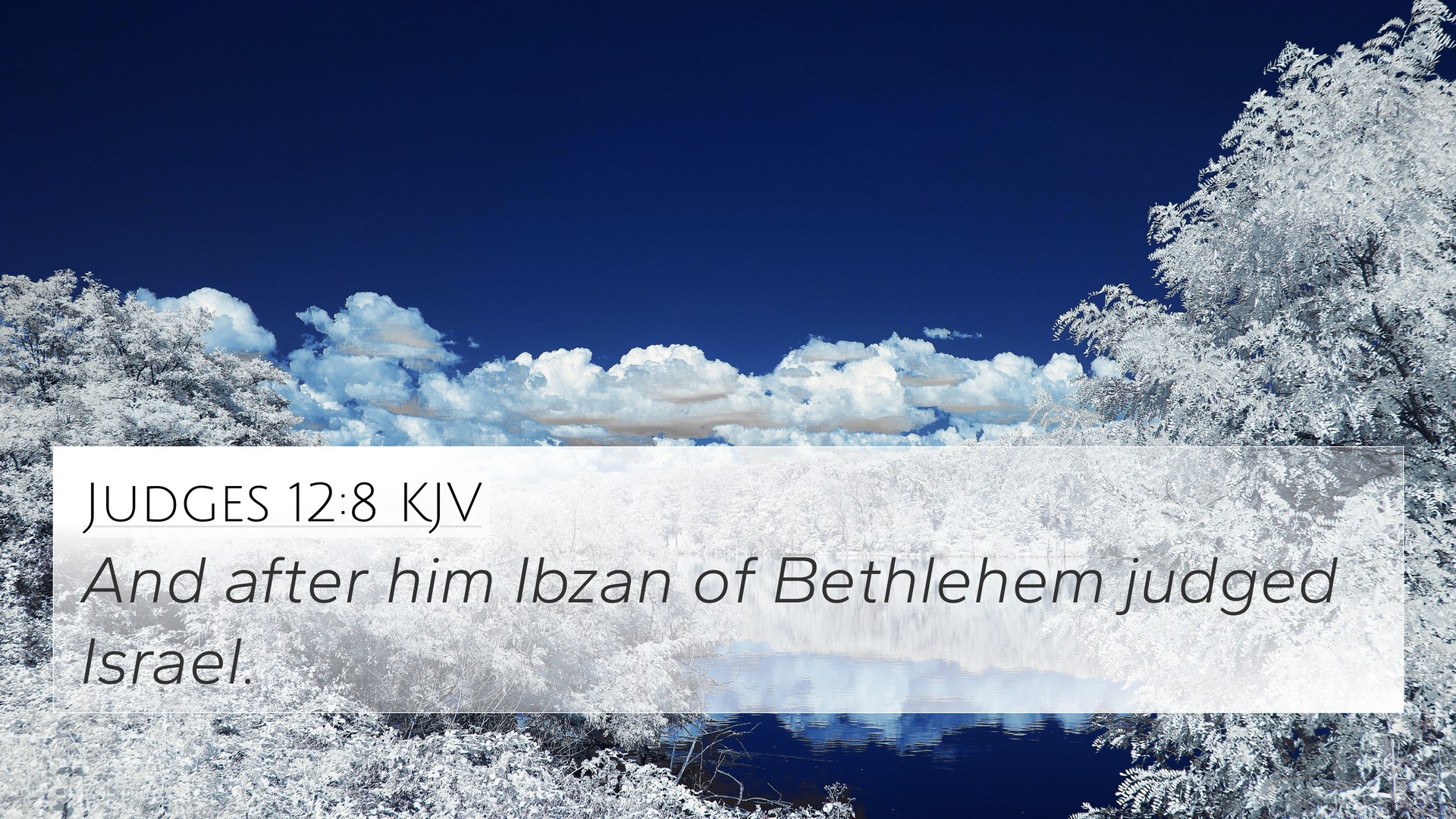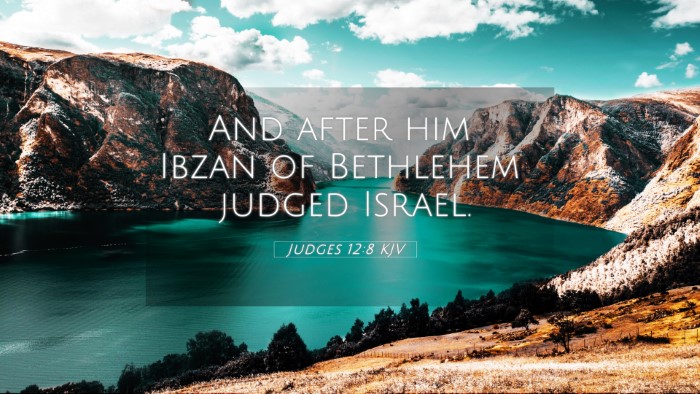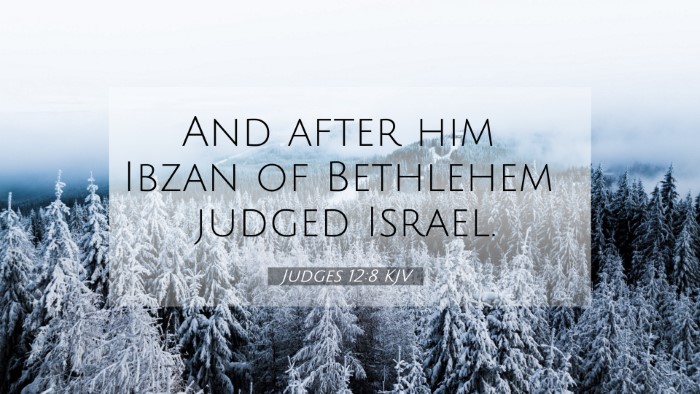Old Testament
Genesis Exodus Leviticus Numbers Deuteronomy Joshua Judges Ruth 1 Samuel 2 Samuel 1 Kings 2 Kings 1 Chronicles 2 Chronicles Ezra Nehemiah Esther Job Psalms Proverbs Ecclesiastes Song of Solomon Isaiah Jeremiah Lamentations Ezekiel Daniel Hosea Joel Amos Obadiah Jonah Micah Nahum Habakkuk Zephaniah Haggai Zechariah MalachiJudges 12:8 Similar Verses
Judges 12:8 Cross References
And after him Ibzan of Bethlehem judged Israel.
Uncover the Rich Themes and Topics of This Bible Verse
Listed below are the Bible themes associated with Judges 12:8. We invite you to explore each theme to gain deeper insights into the Scriptures.
Judges 12:8 Cross Reference Verses
This section features a detailed cross-reference designed to enrich your understanding of the Scriptures. Below, you will find carefully selected verses that echo the themes and teachings related to Judges 12:8 KJV. Click on any image to explore detailed analyses of related Bible verses and uncover deeper theological insights.
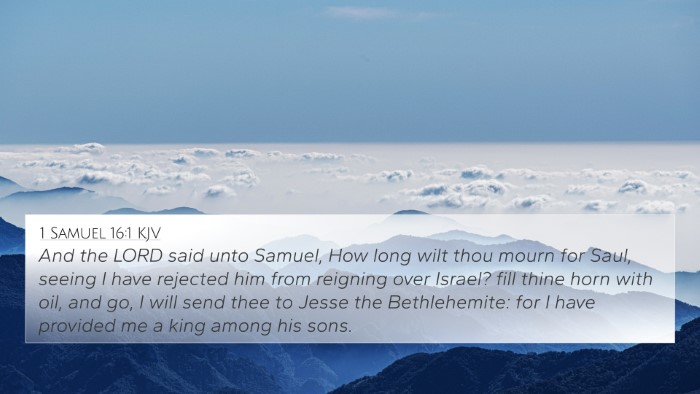
1 Samuel 16:1 (KJV) »
And the LORD said unto Samuel, How long wilt thou mourn for Saul, seeing I have rejected him from reigning over Israel? fill thine horn with oil, and go, I will send thee to Jesse the Bethlehemite: for I have provided me a king among his sons.

Micah 5:2 (KJV) »
But thou, Bethlehem Ephratah, though thou be little among the thousands of Judah, yet out of thee shall he come forth unto me that is to be ruler in Israel; whose goings forth have been from of old, from everlasting.
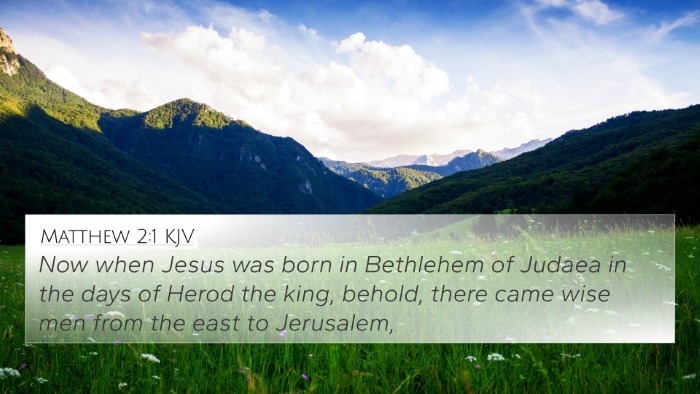
Matthew 2:1 (KJV) »
Now when Jesus was born in Bethlehem of Judaea in the days of Herod the king, behold, there came wise men from the east to Jerusalem,
Judges 12:8 Verse Analysis and Similar Verses
Understanding Judges 12:8
Judges 12:8 refers to the leadership of Jephthah in Israel and his actions during a critical period in the history of the Israelites. This verse provides us with vital insights into the nature of leadership, divine providence, and the complexities of human relationships within the scriptures.
Context and Summary
In the Book of Judges, we observe cycles of Israel's disobedience to God followed by divine punishment through oppression. God raises judges to deliver them from their enemies. Jephthah, one of these judges, is a complex character whose story highlights themes of faith, conflict, and reconciliation.
Verse Overview
Judges 12:8 (KJV): "And after him Ibzan of Bethlehem judged Israel."
Interpretation and Meaning
Based on the insights from Matthew Henry, Albert Barnes, and Adam Clarke, we can draw various conclusions about Judges 12:8:
-
Leadership Transition:
This verse indicates a transition in leadership as Ibzan succeeded Jephthah. It reminds us of the temporary nature of human authority.
-
Tribal Representation:
Ibzan from Bethlehem signifies the importance of tribal representation in leadership roles, which is a recurring theme in the book of Judges.
-
Character Sketch:
Ibzan's leadership can be studied in contrast to Jephthah's complex character, revealing the diversity of leaders raised by God in Israel's history.
-
God’s Sovereignty:
This passage illustrates God's sovereignty in raising various leaders according to His purpose, regardless of their background or past.
-
The Importance of Judgement:
The term "judged Israel" indicates that leadership in ancient Israel was not merely about governance but also moral and spiritual guidance.
-
Social Dynamics:
Understanding the social dynamics between judges in Israel serves as a reminder of the interpersonal relationships within the community.
-
Historical Context:
The era of Judges was marked by instability; thus, leadership was crucial during challenging times, which Ibzan represents.
Cross-Referencing Related Verses
Judges 12:8 can be linked to several other biblical passages for a deeper understanding:
- Judges 11:1-40: The story of Jephthah highlights his struggles and vow, setting the stage for his eventual successor, Ibzan.
- Judges 12:9: This verse continues to provide context on Ibzan's leadership by describing his children and social activities.
- 1 Samuel 12:11: This verse reflects on the role of judges during Israel’s history.
- Hebrews 11:32-34: The New Testament references various judges, including Jephthah, contextualizing their faith and actions.
- Ruth 1:1: The time of the judges intersects with the narrative of Ruth, showcasing the social and spiritual climate of the period.
- Psalm 75:7: This verse speaks of God as the ultimate judge and ruler, complementing the leadership roles discussed in Judges.
- Romans 10:12: The theme of God choosing leaders from various backgrounds connects to the diverse characters in the book of Judges.
Thematic Connections
Exploring the broader themes of leadership, divine sovereignty, and community dynamics provides a richer context for understanding Judges 12:8. These themes resonate throughout both Old and New Testament texts, establishing a dialogue between biblical characters and divine intention.
Tools for Bible Cross-Referencing
Utilizing various tools for Bible cross-referencing can significantly enhance one’s study:
- Bible Concordance: A powerful tool for finding specific terms and their locations in scripture.
- Bible Cross-Reference Guide: Guides that provide links between similar themes and verses across the Bible.
- Cross-Reference Bible Study: Methods for diving deep into the connections between scriptures for sermon preparation or personal study.
- Bible Reference Resources: Tools available in many study Bibles that facilitate thematic connections.
Conclusion
Judges 12:8 serves as a significant intersection point in the narrative of Israel’s history, reflecting critical themes of leadership and divine purpose. By examining this verse through the lens of public domain commentaries, readers can appreciate the complexities surrounding biblical leadership and how such concepts echo through various scriptures. This verse invites further exploration of the interconnectedness found within the Bible—a vital aspect for anyone undertaking comparative Bible verse analysis or thematic studies.
